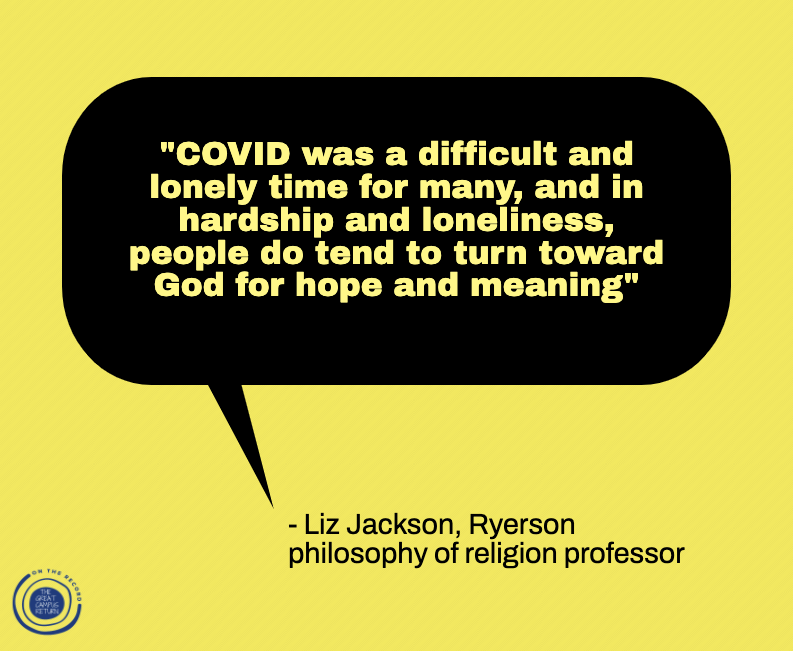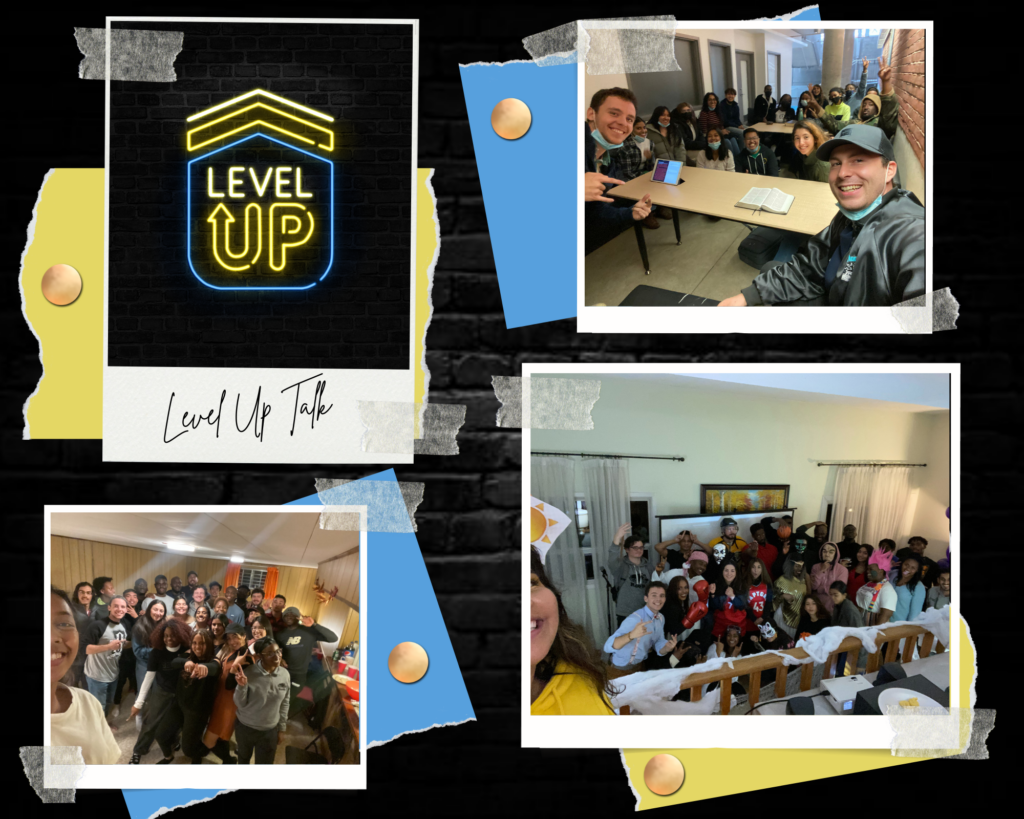
When students return en masse in January, campus religious group leaders say they’ll be doing all they can to attract newcomers looking for a sense of belonging after months of pandemic isolation. At the same time they’re going to build on the lessons they’ve learned about the value of online communities to keep interested those who are already group members.
Dylan Hoerner, leader of Level Up Talk, a faith discussion group at Ryerson, said that a newfound quest for answers in religion is something he’s noticing in his own group. People are turning to this community in the aftermath of pandemic isolation.
“People are really scared during the pandemic and there hasn’t been any way for people to connect,” said Hoerner. “They’ve really been happy to not only meet new people, but also to have meaningful discussions.”
RELATED: A comic ode to online learning
Much of what the groups did during the pandemic to grow their communities centred on creating an online presence that’s accessible to young people outside of formal religious institutions.
According to Amreet Kaur, president of the Sikh Students Association, that will likely still exist after the pandemic.
“All the religious establishments, we weren’t even allowed to enter them. Because of that, I saw how online platforms increased and how people were creating communities online,” said Kaur.
Hoerner agrees, saying he sees the virtual community that grew during the pandemic still being a part of his group even when students return to campus.
And John Carter, chair of the Chinese Christian Fellowship at Ryerson, says his group won’t return to in-person activities exclusively, but will instead create a “hybrid” presence.
LETTER FROM ABROAD: Is Ryerson doing enough to make sure international students can come back?
According to the Mayo Clinic, the COVID-19 pandemic has complicated people’s relationship with religion with increased feelings of fear, uncertainty, isolation and grief. The aftermath of this has changed how people think about religion.
One in five Canadians who identify as religious say their faith was strengthened during the pandemic, according to a 2020 Angus Reid poll.
The study found that out of 59 per cent of Canadians who pray, more than one in five said that they turned to prayer more often since the pandemic began.
That’s not surprising, given that, throughout history, people have traditionally turned to religion to seek comfort and reassurance in times of turmoil.
Liz Jackson, a philosophy of religion professor at Ryerson, said that people turning to religion while experiencing feelings imposed by the COVID-19 pandemic is habitual.
RELATED: More online therapy key to dealing with growing demands for mental health counselling
“COVID was a difficult and lonely time for many, and in hardship and loneliness, people do tend to turn toward God for hope and meaning,” said Jackson.
That’s one of the reasons Carter anticipates post-pandemic religious questioning from students.
“It’s a really good time for university students to really reflect on deep life questions,” Carter said.
The Chinese Christian Fellowship has historically been an inclusive Christian religious group that catered to the Chinese and Christian community. However, Carter, its chair, is not Chinese.
“(It’s) space for community, whether you’re Christian, Chinese or none of the above, (we) just come together [to] learn about Christ,” he said.

Hoerner’s group started at York University, but is now being launched at Ryerson. Keeping religion relatable and interesting is the group’s cornerstone, something that stems from his personal journey with faith.
Hoerner grew up going to church but lost his faith in religion as he got older, identifying as agnostic (the belief that it’s not possible to know for certain if God exists) for a period of time and even having thoughts of atheism.
Hoerner said his loss in faith was in part because he was taught the Bible without context. In other words, he was taught the Bible by someone telling him it was important, but not working with the text to establish the importance of it.
“I didn’t know what to believe. It wasn’t until someone basically sat down and took the time out of the day to study the Bible with me that I was honestly blown away by what I read.”
But Hoerner knows that not everyone has someone to guide them through faith, which is why he is a part of Level Up Talk.
Their discussions and gatherings focus on everyday occurrences rather than religion-specific issues, which they then translate to a religious context.
“We’ll talk about some type of topic that can relate to our everyday lives and then we’ll open up the Bible and see what answers are in there for that,” said Hoerner.
For Kaur and the Sikh Students Association, their religious group shares the same goal of taking ancient religious beliefs, text and activities and making them more relatable.
One of these aspects of the modernized version of Sikhism is the idea of religious talks and insights, something that’s important to the core of Sikh practice.
Kaur says it’s important to translate this practice for the modern era. She organizes this by calling in speakers who are in their 20s and 30s, to be more relatable and approachable figures to Sikh students.
“They’re able to give examples in our analogies that relate to the students,” she said.
RELATED: Amid worsening mental health, students are anxious to return to in-person classes
Reliability and comfort also means inclusivity for Kaur. She recognizes that Ryerson is a commuter school and thus the religious group welcomes members from multiple regional areas that share the same faith.
Cities like Brampton and Mississauga have large Sikh populations, but also have high populations of students that commute to Ryerson. Because of this, Kaur said that a lot of first years who come to Ryerson have already been a part of a Sikh religious group in their high school, which creates a familiar sense of comfort and space for belonging.
“For first-year students, these religious groups continue from high school into university,” said Kaur. “It provides them a sense of familiarity and a place where they feel safe, because they know mostly how it’s run, they know what to expect.”
But wanting those students to continue to join the religious group involves making those religious groups a community space that is inviting and not intimidating.
Carter said that the Chinese Christian Fellowship is prioritizing faith while incorporating time for games and other activities that help build community.
“Going out, having fun and just sharing with one another [what] we’re struggling and going through and just lifting one another up as friends and [as] brothers and sisters,” said Carter.
Jordan Goldenberg is the president of Hillel Ryerson, the university’s home for Jewish life and leadership experiences on campus. Although a mostly student-led team, Hillel Ryerson also incorporates a rabbi in the group. Rabbi Aaron Greenberg is with Hillel part time and brings a veteran figure to religious leadership and faith.
“[Greenberg] provides multiple entry points for Jewish students to experience Jewish life on campus through learning initiatives, holiday celebrations and pastoral support,” said Goldenberg.
But that doesn’t mean that Hillel Ryerson is taking a completely traditional route with their group. Goldenberg said that their group adapts to the needs of their members and its leaders are growing and adapting their traditional faith by communicating it in ways that people can engage with.
“[We] have a strong social media presence, helping to maintain our presence and relationships on campus,” said Goldenberg.
Jackson said that the online platforms of religious groups go further than just having a media presence, as this presence can help connect people with similar interests, which is beneficial to religious belonging.
“These enable them to reach people they wouldn’t have otherwise,” she said. “They make church and religion more accessible to people.”
One of those adapting needs for members is accepting the fact that some students may still prefer digital and virtual faith options.
The Angus Reid study into faith communities looked at members of the three monotheistic religious groups: Islam, Christianity and Judaism. The study found that technology was a main force in people’s access to religious belonging and faith during the pandemic.

For Hoerner and Level Up Talk faith discussions, it might mean having virtual and in person events every week. He added that prioritizing health protocols is key to a safe return for the group’s members, and it’s the safest way to take a step toward normalcy.
“Everyone has to mask up,” he said. “[But] sometimes it’s more damaging to be alone, so it’s a risk that we’re willing to take just so people can be connected with each other.”
For Kaur and the Sikh Students Association, online and virtual events will continue as they offer a post-pandemic opportunity that enables the ability to reach a broader audience.
“(It’s) the convenience of having a space no matter where you’re at and connecting with a broader group of people.” Kaur said. “Because you’ve seen people connecting with people in other countries, these communities can grow so extensively.”
Carter also said that his group will not exclusively return to in-person activities.
“We’re going to maintain hybrid status, but probably shift and hope to be in person every week.”
Even though Ryerson’s fall 2021 semester was a transitional semester with various essential student services opening back up, Ryerson’s multi-faith prayer rooms have remained closed, despite Ryerson residences welcoming back students into shared living spaces.
READ MORE:
- Ryerson’s proof of vaccine system leaves room for errors, experts say
- Ryerson 1 of only 7 Ontario universities choosing not to publicly report COVID-19 cases — even as a new variant sweeps the globe
- What Ryerson isn’t telling us about the return to campus
Ryerson president Mohamed Lachemi said that the prayer spaces, located in the Student Campus Centre, are run by Ryerson’s student union and that students should anticipate access to these resources starting January.
“It’s my understanding that the current plan is to have the suite of the campus (student) centre, including the multifaith prayer spaces, open to the campus community in the winter semester,” Lachemi said.
Whether they are going to be meeting online or in person, many religious groups are looking to the first week on campus in January as an orientation week setup, sending members of their group to recruit new students.
“We market ourselves as an open, welcoming and inclusive space and are very excited to get to know our new members,” Goldenberg said.
Ambika Sharma was the Co-Sports Editor/Reporter of On the Record for the Fall 2021 semester.
This article may have been created with the use of AI tools such as
Ambika Sharma was the Co-Sports Editor/Reporter of On the Record for the Fall 2021 semester.

